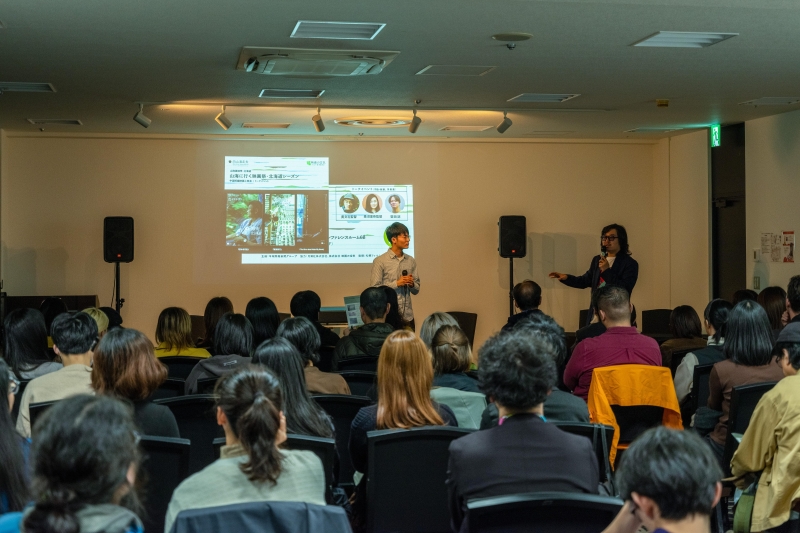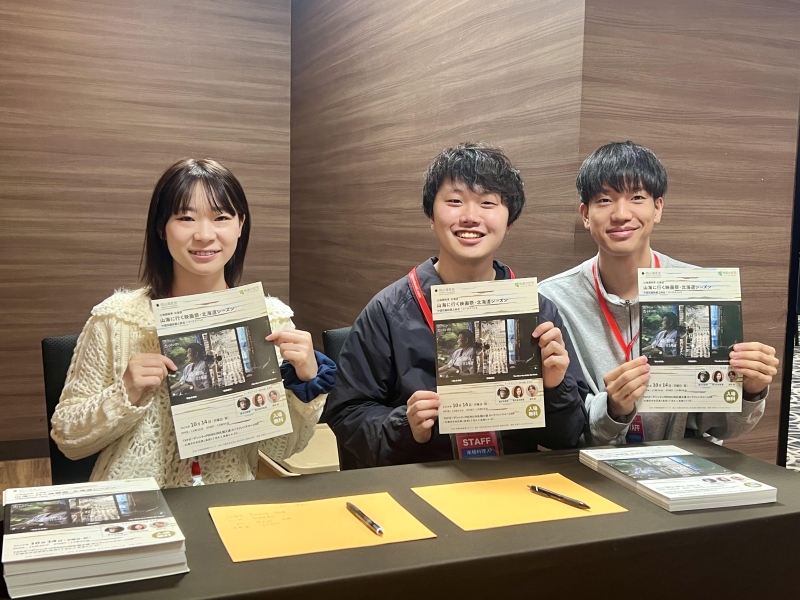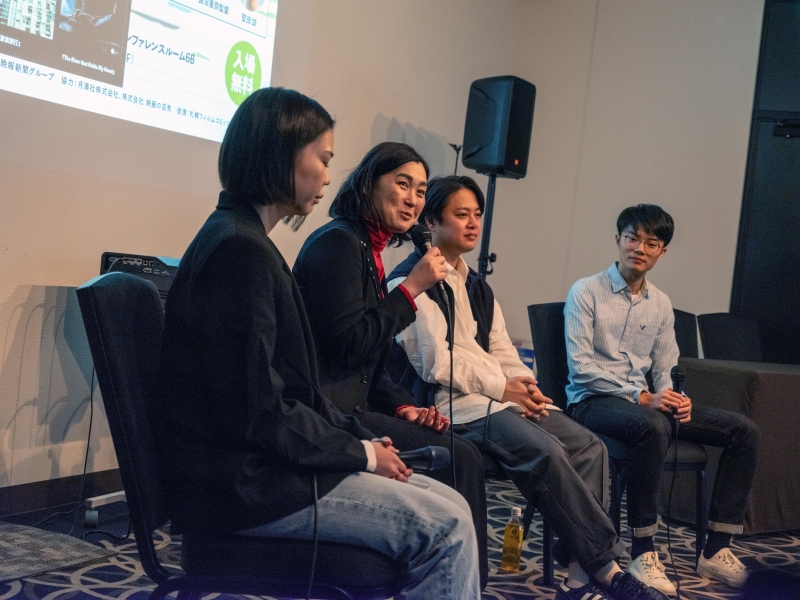【雲上嶺南】Maritime Guangdong Program short films debut in Japan, Lingnan culture captivating the audience
山海計劃短片首次“出海”日本 嶺南風情打動觀眾
"It's rare to see works from a new generation of Chinese directors!" "This has completely reshaped my impression of Chinese cinema." "Once again, I'm struck by the vastness and cultural diversity of China." On October 14th, the "2024 Maritime Guangdong Young Director Support Program" (hereinafter referred to as the Maritime Guangdong Program), organized by Yangcheng Evening News Group, kicked off its 2024 film screening season in Sapporo, Hokkaido, Japan. After watching the films, Japanese audience members shared their excitement and impressions.
Following its successful screenings in Kuala Lumpur, Malaysia, In 2023, the Maritime Guangdong Program short films have once again gone abroad. On this occasion, Many Japanese filmmakers, cultural scholars, and film enthusiasts attended the screenings, engaging in direct dialogue with the young directors. The discussions extended beyond cinema, touching on the different creative environments of Chinese and Japanese directors and the shared cultural resonance between Chinese and Japanese youth.
This event is organized by Yangcheng Evening News Group, supported by the Sapporo Film Commission (SFC), with academic backing from the Graduate School of Humanities and Human Sciences at Hokkaido University. KOO-KI Co., Ltd. And Tsukimansha Holdings Co., Ltd. Are co-sponsors of the event. In addition to screening the short films, the Maritime Guangdong Program's organizing committee held discussions with organizations such as the SFC and the Sapporo International Short Film Festival (SFF), exploring opportunities for future cross-border collaborations to promote intercultural exchange through cinema.
Enthusiastic response at the screening
The 2024 Maritime Guangdong screening season in Hokkaido featured three short films: "Migratory Bird", "How Can I Rid My Mind of Her", and "The River That Holds My Hand". All three works were directed by emerging filmmakers from the Guangdong-Hong Kong-Macao Greater Bay Area, who were selected for the Maritime Guangdong Program in 2023 and supported with funding for their creations. "Migratory Bird", directed by Su Zeliang, tells a family story set in Hong Kong; "The River That Holds My Hand", directed by Chen Jianhang, captures a shared sense of nostalgia between Chaozhou, china, and Ho Chi Minh City, Vietnam; while Huang Wenli's "How Can I Rid My Mind of Her" follows the journey of a Vietnamese returnee working at a tea factory in Qingyuan, Guangdong, as he grapples with personal loss and pain. Notably, "How Can I Rid My Mind of Her" has already been nominated at several domestic and international film festivals, Including the ongoing 19th SFF.
The news that these three Lingnan short films were coming to Sapporo quickly spread across the city, thanks to local media like the Hokkaido Shimbun Press. By the time the event took place, the screening room was packed, with extra chairs needed to accommodate the overflow of viewers. Though the films were shot in Lingnan dialects, the emotions portrayed transcended language barriers, and the thoughtful Japanese subtitles helped the audience fully immerse themselves in the stories. The 90-minute screening flew by, and after it ended, the room was filled with applause, reflecting the audience's deep appreciation for the films.
Huang Wenli, director of "How Can I Rid My Mind of Her", expressed his gratitude on behalf of the young filmmakers for the warm reception. although slightly nervous in front of the international audience, He quickly relaxed as they eagerly raised questions one after another. "What's the special significance of tea in the film?" "Is there a difference in meaning between the Chinese and Japanese titles?" "Why did you combine a story about overseas Chinese with a love story?" huang patiently answered each question, explaining that the film's inspiration came from real-life historical events involving Vietnamese returnees, especially the dramatic scenes of families making their way back to China: "One family took two boats, anticipating the potential dangers of a sea storm. It made me wonder—if the storm had truly come, and one boat sank, How would the remaining family members live the rest of their lives?"
A member of the audience asked about the film's open-ended conclusion: "The man goes to the sea that took his wife—was he there to mourn or to say goodbye?" huang responded: "The ending poses a question. When the tides of history push us forward, do we remain stagnant, or do we try to take a step forward? The man in the film takes his step forward."
Sapporo extends an invitation to Chinese filmmakers
In addition to engaging with the audience, Huang also participated in a roundtable discussion with representatives from Japan's film and academic communities. Japanese director Rina Naganuma, noted film scholar and critic Ryo Kata, and Yuna Haga from the SFC joined Huang to discuss the film industries and creative processes in China and Japan.
Rina Naganuma, who has worked closely with young filmmakers from Hong Kong and Macao in the past, was impressed by the "quiet" style and mature use of long takes in the three short films. Ryo Kata praised the film "How Can I Rid My Mind of Her" for its excellent audiovisual language, stating, "It not only captures the essence of Lingnan visually, but its sound design also sparks rich oceanic imagery of China."
During the discussion, Huang shared his concerns as a new director: "Do you think my film is too slow-paced? Is there really a market for films like this?" Rina Naganuma confidently replied: "I didn't find it boring at all. On the contrary, It moved me deeply." she even compared Huang's style to that of Chinese director Bi Gan, whose films have gained significant popularity in Japan in recent years. Ryo Kata smiled and gestured to the packed audience: "Just look at the crowd here—that's your answer. If you ever make a feature film, I'd love to be one of your first viewers."
Yuna Haga from the SFC inquired about the various shooting locations in the film and whether there were any challenges during production. Huang credited the support of Yangcheng Evening News Group, saying, "Thanks to their help—not only with funding but also with logistics like locations—we were able to overcome many hurdles."
Yuna Haga then extended an invitation through Yangcheng Evening News to Chinese filmmakers, encouraging them to come to Sapporo for future projects. She highlighted the city's film incentive policies: "For films with at least seven days of shooting in Sapporo, the SFC can offer a subsidy of up to 10 million yen."
Lingnan culture captivates Japanese audiences
Discussing the career paths of young filmmakers in China and Japan, rina Naganuma expressed admiration for the formal education many Chinese filmmakers receive. She noted: "I grew up learning on set after high school. In fact, Many Japanese filmmakers never went to college. after watching these three Maritime Guangdong Program short films, I'm struck by how polished the techniques of China's young directors are!I wonder how far Japan's young filmmakers could go if they had the same professional training."
Naganuma also commented that the films offered a refreshing view of Chinese mainland cinema: "Previously, our impression of Chinese mainland films was mostly of big-budget productions. This time, we saw something completely different, and it felt incredibly fresh." she encouraged the young directors to stay true to their style, citing how filmmakers like Takeshi Kitano and Hirokazu Koreeda have achieved success with "quiet" films on the global stage while maintaining solid domestic box office returns.
Ryo Kata shared a similar sentiment, saying: "Rather than focusing on differences, I see more similarities between young filmmakers in both countries. Before they become famous, they often work with limited budgets, Leading them to explore personal themes like love and family." however, He was especially captivated by the unique charm of Lingnan culture portrayed in the Maritime Guangdong Program films, stating, "The architecture in southern China is something I've never seen before. China's vast and diverse landscapes allow for a wide variety of cinematic expressions."
Naganuma echoed his thoughts, noting, "Japan is an island nation with a smaller geographic area, so our culture isn't as diverse as China's." she also mentioned that the overseas Chinese culture depicted in the films was new to her and praised the rich sense of history in the works: "While Japanese filmmakers often focus on the present, chinese directors frequently draw from historical contexts, which I find deeply moving."
About the Maritime Guangdong Program
The Maritime Guangdong Program, organized by Yangcheng Evening News Group, Is a major talent initiative aimed at discovering, nurturing, and supporting outstanding young Chinese directors worldwide. Centered in the Guangdong-Hong Kong-Macao Greater Bay Area, the program seeks emerging voices in film creation, offering support for short films across various genres, Including narrative, documentary, and animation. Through this program, young filmmakers are encouraged to push the boundaries of Chinese cinema and present the world with new perspectives on Chinese stories.
“很難得能看到中國新一代導演的作品!”“刷新了對中國電影的印象。”“再次感嘆中國地域的廣闊和文化的多元。”10月14日,由羊城晚報報業集團主辦的“向山海走去”青年導演創作扶持計劃(以下簡稱山海計劃)在日本北海道札幌開啟2024年度山海展映季首站活動,觀影后日本觀眾如是表達自己的心情。
這是繼2023年度山海放映季奔赴馬來西亞吉隆坡之后,山海計劃短片再次“出海”。當天,眾多日本電影人、文化學者和影迷前來觀影,并與山海計劃青年導演面對面交流。從中日導演的不同創作生態,到中日青年的文化共鳴共振,話題的范疇逐漸超越了電影本身。
山海展映季北海道活動由羊城晚報報業集團主辦,札幌電影委員會支持,北海道大學大學院文學研究院提供學術支持,電影空氣株式會社、月滿社株式會社協辦。除了為日本觀眾帶去山海計劃短片,山海計劃組委會還將和札幌電影委員會、札幌國際短片電影節組委會等機構接洽座談,探討未來加深跨國合作的可能性,以電影之力促進跨文化交流。
放映現場反響熱烈
2024年度山海展映季北海道活動為日本觀眾帶去的三部短片是《家庭旅行》《海水泡的茶是什么味道》《The River That Holds My Hand》。三部作品均由粵港澳大灣區新生代導演執導,他們于2023年入選山海計劃并獲得扶持金用以創作。青年導演蘇澤朗的《家庭旅行》講述發生在其家鄉香港的家庭故事,陳堅杭的《The River That Holds My Hand》試圖在中國潮州和越南胡志明市捕捉同一縷鄉愁,黃文禮的《海水泡的茶是什么味道》則講述在廣東清遠茶廠工作的越南歸僑男子如何面對人生的傷痛與失去。其中,《海水泡的茶是什么味道》曾入圍多個國內外電影節展,包括正在舉辦的第19屆札幌國際短片電影節。
三部來自中國嶺南的短片要來札幌了!活動開始前一周,山海展映季的消息便隨著北海道新聞等當地媒體的傳播在當地傳開。活動當天,人們很快就坐滿了放映廳,工作人員不得不臨時“借”椅子以應對更多觀眾的到來。三部短片均用嶺南方言拍攝,但超越語言的情感加上貼心的日文字幕讓觀眾很快便沉浸其中,一個半小時的觀影時光轉瞬即逝。放映結束后,滿場觀眾用長久的熱烈掌聲表達對作品的喜愛。
《海水泡的茶是什么味道》導演黃文禮,代表山海計劃的青年導演們感謝觀眾的到來。他面對海外觀眾時的稍許緊張,很快便被臺下觀眾一個接一個的熱情提問打破。“茶在電影里的特殊意義是什么?”“電影的中文名和日文名有什么不同涵義嗎?”“為何將華僑故事和愛情故事融合在一起?”觀眾都想知道更多電影背后的創作故事。黃文禮一一坦誠作答。他告訴觀眾,故事的靈感來自越南歸僑的真實歷史,尤其是他們當年輾轉回國的場景:“一家人乘坐兩條船,以應對海上可能發生的風暴。這讓我不由想象,假如風暴真的降臨,一條船帶著半個家庭沉沒,被留下的人會度過怎樣的后半生?”有觀眾與他探討影片的開放式結尾:男子去看曾經吞沒他妻子的大海,到底是緬懷,還是告別?黃文禮的回答是:“這個結尾是一個提問,當時代的洪流在推著我們前進,我們是裹足不前,還是試著往前走一步?電影里的男子,走出了屬于他的那一步。”
札幌向中國導演發出邀請
除了與觀眾交流,黃文禮這天還代表山海計劃青年導演,與日本電影界和學界的代表對談。日本青年導演長沼里奈、知名電影學者和電影評論家堅田諒、札幌電影委員會代表芳賀優菜,與黃文禮一道,圍繞中日電影產業與創作展開探討。
長沼里奈過去曾與中國香港和中國澳門的青年創作者們聯系緊密,這是她第一次接觸來自中國內地的青年導演作品。她表示,三部作品的“安靜”風格以及對長鏡頭的成熟運用,都給她留下了深刻的印象。堅田諒則著重指出《海水泡的茶是什么味道》中視聽語言的優秀,“不僅從視覺上傳達了中國嶺南的風情,聲音設計方面也非常巧妙,激發了關于中國的海洋想象”。
交流中,黃文禮坦誠表達了自己作為一名新導演的困惑:“你們會覺得我的片子沉悶無聊嗎?像這類片子真的會有市場嗎?”長沼里奈果斷回答:“我不覺得無聊,相反,我的心靈受到很大的震動。”她還說,黃文禮的風格讓她聯想到了中國青年導演畢贛的作品,“他近年來在日本市場可是頗受歡迎”。堅田諒則笑著指著臺下:“看這滿場的觀眾,你就知道答案了。如果以后你拍了長片,我很愿意成為第一批觀眾。”
札幌電影委員會代表芳賀優菜向黃文禮了解影片取景的經過。她問道:“我發現影片中有很多不同的場景,在取景時遇到過場地方面的難題嗎?”黃文禮回答:“感謝出品方羊城晚報報業集團的支持——除了創作扶持金,我們在包括場地在內的很多方面都得到了很大的幫助。”
芳賀優菜表示,她想通過羊城晚報向中國的電影創作者們發出邀約,請大家多到札幌來拍片。她介紹當地的電影優惠政策:“電影只要在札幌有7天以上的拍攝行程,札幌電影委員會就能給予最高1000萬日元的補助金。”
嶺南風情打動日本觀眾
談及中日青年電影人的成長軌跡,長沼里奈對中國青年電影人多受過良好的電影專業教育表示羨慕。她透露:“我是高中畢業后,在片場的實踐中成長起來的。事實上,很多日本青年電影人都沒上過大學。當我看完三部山海計劃短片后,很大的感受是中國的青年導演的電影手法太成熟了!我不禁想,如果日本的青年導演們也接受過相同的專業教育,他們的作品或許能更上一層樓。”
長沼里奈還表示,山海計劃短片刷新了她對中國內地電影的看法:“過去,我們對來自中國內地的電影,印象多是那些大制作的片子。但這次,我們看到了完全不一樣的東西,感覺非常新鮮。”她鼓勵山海計劃的青年導演們堅持自己的風格,“在日本,北野武和是枝裕和等導演都拍過‘平靜’的電影,在國際上取得了名次,也在國內獲得了不錯的上座率”。
對中日的青年創作者,堅田諒的看法是:“與其說不同,我更多感受到他們的相同之處。在成名之前,他們都沒有太多的預算,因此多半會選擇自己感受最深的題材進行創作,比如愛情和家庭。”盡管題材相似,但堅田諒還是被三部山海計劃短片中的嶺南風情深深打動,“像中國南方的建筑物,那是從沒去過中國的我從未見過的”。他說:“中國太大了,每個地方的風貌都如此不同,這能讓中國的電影創作呈現出非常多元的姿態。”
長沼里奈也發出了相似的感嘆:“日本是一個島國,地理面積沒有中國那么大,因此文化也沒有中國那么多元。”她透露,像本次山海展映季作品所帶去的華僑文化,對她來說也是第一次深入接觸。她被中國青年導演們作品中展現的歷史厚重感所打動,“日本的青年創作者更關注身邊的事,不太喜歡回憶或反思,但中國的導演很多都會從歷史的脈絡中尋找當下,這點讓我很感動”。
關于山海計劃
山海計劃是由羊城晚報報業集團主辦的對海內外優秀華人青年導演進行挖掘、孵化、選拔和培養的大型人才扶持活動。活動立足粵港澳大灣區,面向全球尋找影像創作領域的新銳力量,支持他們探索劇情、紀錄、動畫等不同類型的短片創作,突破和展開對未來華語影像文化的想象之路,也讓世界通過影像重新發現中國。
來源:羊城晚報







